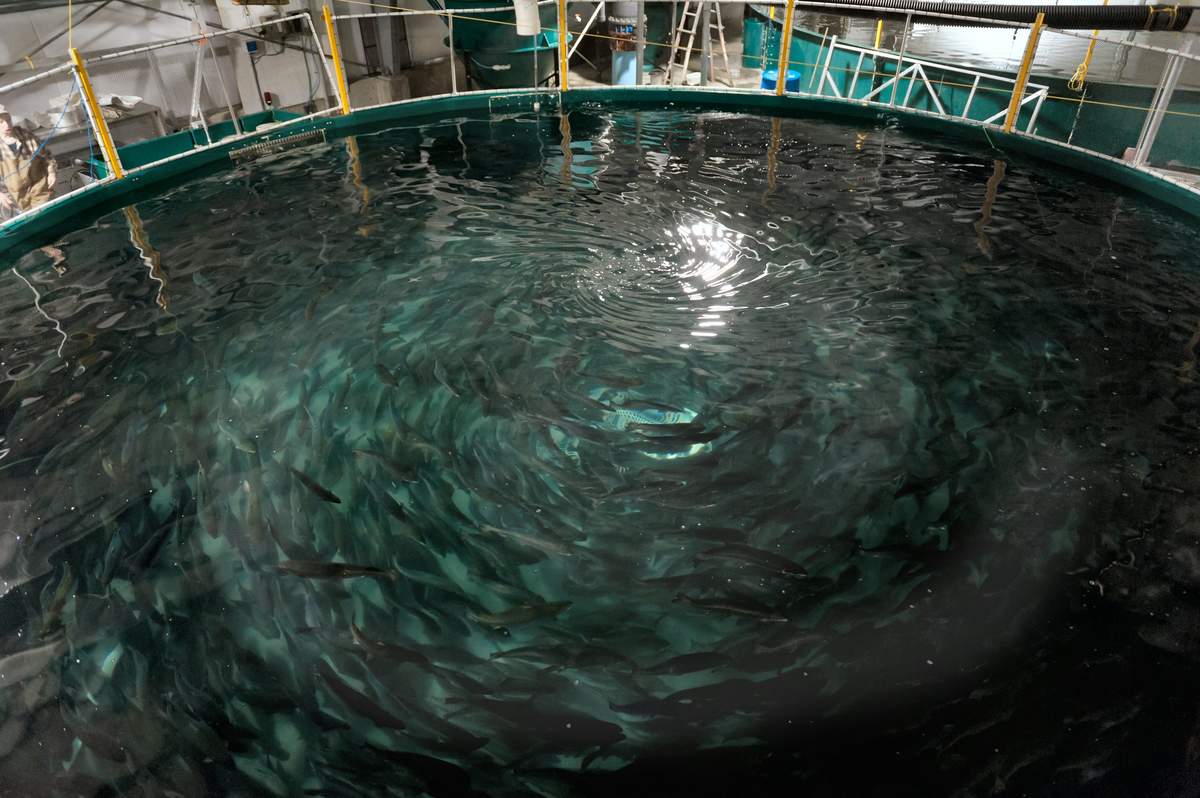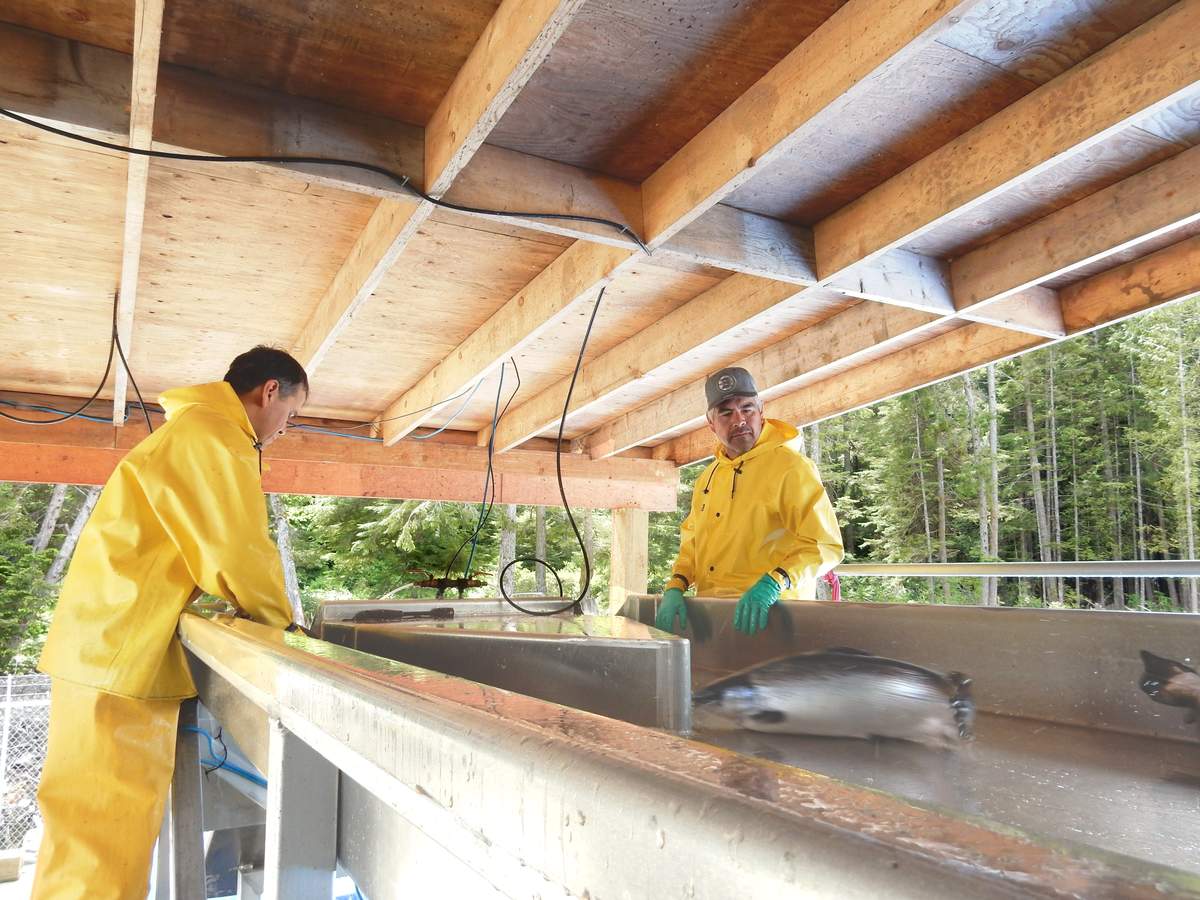
Ontario’s public service heads back to the office, meaning more traffic and emissions
For 15 years and counting, my commute from Mississauga to Toronto has been mired by...
Fish farm opponents and proponents alike are waiting with bated breath as a bill to phase out open net pen aquaculture farms in Washington State sits on Governor Jay Inslee’s desk for final approval.
If Governor Inslee signs the bill, it would mean the end of farmed Atlantic salmon reared in open net pens in every jurisdiction on the West Coast of North America — except British Columbia. Alaska practices a controversial form of salmon ranching, but the state, along with California and Oregon, does not allow open net pen fish farm operations.
As pressure mounts on Washington State, where a mere 10 fish farms are in operation, attention has turned to British Columbia where more than 100 fish farms dot the southern and central coasts.
The B.C. government is currently considering whether or not to renew the tenure of 22 operations, 18 of which are clustered in the Broughton Archipelago, a narrow wild salmon migratory route between the mainland and Vancouver Island where local First Nations have historically opposed the aquaculture industry.
A spokesperson from Inslee’s office told DeSmog Canada the Governor has “publicly stated that he supports removing non-native fish from Washington state waters.”
The e-mailed statement read: “As fish don’t respect man-made borders, it would likely have an impact on British Columbia. However, the governor’s office believes that B.C. should do what is best for the province.”
Doug Donaldson, B.C. Minister of Forests, Lands, Natural Resource Operations and Rural Development told DeSmog Canada, “we’re aware of what is happening in Washington state, which does not affect the process we’re following in B.C.”
“We’re committed to wild salmon,” the minister said via an e-mailed statement. “We’re engaged with First Nations on a government to government basis to address concerns that First Nations have with fish farms in their territories.
“What’s happening in Washington State is really exciting for those of us trying to get farms out of the water in B.C. for the last two decades,” said Aaron Hill, executive director and ecologist with Watershed Watch Salmon Society.
“There’s growing evidence that fish farms spread diseases and parasites to wild salmon and the Washington State government has recognized that and they’ve taken real action that we need B.C. to follow suit with.”
Hill said some B.C. politicians have floated moving the fish farm tenures to ocean areas outside the Broughton Archipelago, an idea he said doesn’t represent a true solution.
“Sure, you’d get these fish farms out of these migratory choke points, but they’d still be out there spreading diseases and viruses in someone else’s territory.”
When asked if the B.C. government is considering relocating farmed fish operations from the Broughton Archipelago to alternate locations, the department of Forests, Lands, Natural Resource Operations and Rural Development provided a statement saying, “the province is concerned about protecting wild salmon and the migratory routes that they use and is interested in moving to closed containment where feasible.”
Pressure escalated in Washington State in August of 2017 after a net at a fish farm, owned and operated by the Canadian company Cooke Aquaculture, failed, releasing over 240,000 farmed Atlantic salmon, considered an invasive species, into the Pacific.
In February the results of a multi-agency investigation into the incident found Cooke Aquaculture failed to adequately maintain its nets, which were burdened 100 tonnes of mussels and debris, causing a ‘reckless disregard’ for the state’s waters and people.
The report was swiftly followed by proposed legislation to phase-out the industry.
State senator, Democrat Kevin Ranker, said Washington’s efforts will be less effective if B.C. doesn’t follow suit.
“The salmon, the orca whale, the ecosystem doesn’t recognize the international boundary,” Ranker told the Canadian Press.
“So what we have to do is manage our transboundary region in a responsible way. And I hope Washington state will pass this legislation and move in this direction and I hope that British Columbia will do the same.”
In B.C., where wild salmon stocks have been in a precipitous decline for several years, critics say not enough has been done to monitor stocks and eliminate threats.
The 2012 Commission of Inquiry into the Decline of Sockeye Salmon in the Fraser River, headed by Justice Bruce Cohen, cost taxpayers more than $37 million and made 75 recommendations designed to save wild salmon runs after the disastrous 2009 sockeye run.
But according to Watershed Watch Salmon Society, very few of those recommendations have been acted on, including the removal of fish farms from the Inside Passage if they’re found to represent even a minimal risk to wild salmon.
“There’s this huge range of threats to our salmon runs and the viruses and parasites from salmon farms are something we can actually do something about. We can actually remove that threat,” Hill said.
“It’s not the only thing. It’s not a silver bullet but it’s an important thing we can do.”
Stan Proboszcz, science and campaign advisor with Watershed Watch, said the need to help wild stocks rebound is becoming more urgent.
“Just look at the recent announcement with regard to Fraser sockeye: 8 of the 24 populations are listed as endangered. Those fish swim directly through the migratory bottleneck that is filled with samlon farms that amplify parasites and diseases.”
“Removing salmon farms from wild salmon migration routes would go a long way.”
Proboszcz pointed to a 2008 bipartisan provincial report that recommended the aquaculture industry be transitioned to closed containment.
“I think the biggest barrier to be quite honest is political leadership — and not just currently but for a long time.”

Farmed Atlantic salmon in a closed containment land-based fish farm, Kuterra, run by the ‘Namgis First Nation in Port McNeill. Photo: Kuterra
Don Svanvik, chief counsellor for ‘Namgis First Nation, said it’s clear to him the future of salmon farming in B.C. is land-based.
“It’s the answer,” Svanvik told DeSmog Canada. “The godfather of all of this — Norway — is even moving to land-based farms now.”
“If you look at the history of fish farms in Norway, all the trouble they’ve had with disease and sea lice, it’s no wonder they’re going on land. And all the problems they’ve had there we’re having here now.”
Svanvik said when it comes to land-based fish farming in B.C., his nation has already proven it’s feasible.
Kuterra, an onland closed containment fish farming system, is owned and operated in Port McNeill by the ‘Namgis.
Josephine Mrozewski, spokesperson for Kuterra, said the operation is the primary example in North America of the promise of land-based Atlantic salmon farming.
Started in March 2013, Kuterra began selling land-farmed salmon on the market in April of 2014.
“When we started it was to prove out the viability of the biology, the technology and the business case for doing things this way,” Mrozewski said. “We really have fulfilled our mission.”
Kuterra, which was started with philanthropic funding, is now seeking outside investment to scale up production.

Salmon harvest at Kuterra. Photo courtesy of Kuterra.
The company produces 300 tonnes of farmed salmon each year but estimates it needs to get to 1,200 tonnes to be profitable.
B.C. has a huge advantage when it comes to developing a land-based aquaculture industry, Mrozewski said, because much of the infrastructure and expertise is already in place.
“What is adding urgency is the U.S. is catching up quickly.”
A single Florida facility in development is expected to produce as much land-based salmon as is produced in all of B.C. waters as early as 2020.
A surprising amount of salmon can be produced in on-land facilities, Mrozewski said, estimating all of B.C.’s open net operations could be reproduced in a single facility less than half the size of Stanley Park.
“Our footprint is very small. But it does take a lot of money,” she said, adding costs are declining now that ventures like Kuterra have smoothed the learning curve.
The ‘Namgis have recently appealed to the courts for an injunction to prevent Marine Harvest from restocking its operation near Swanson Island.
All three parties in B.C. have emphasized the importance of protecting wild salmon.
“But we need to see meaningful action soon,” Proboszcz said. “Otherwise we’re just going to keep hearing horror stories in the news.”
Enbridge Gas will face Waterloo Region in a hearing before the Ontario Energy Board to renew an agreement that would allow the company to continue...
Continue reading
For 15 years and counting, my commute from Mississauga to Toronto has been mired by...

For our last weekly newsletter of the year, we wanted to share some highlights from...

The fossil fuel giant says its agreement to build pipelines without paying for the right...